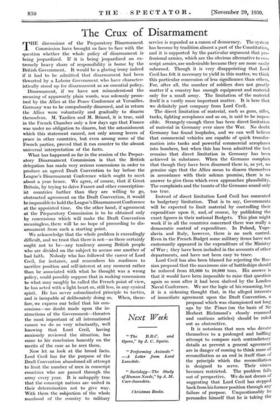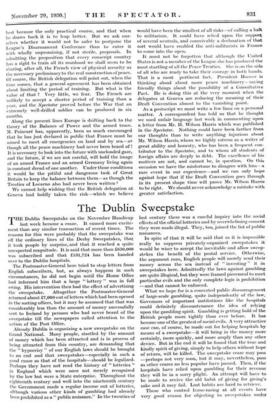The Crux of Disarmament
THE discussions of the Preparatory Disarmament Commission have brought us face to face with the question whether the whole policy of disarmament is being jeopardized. If it is being jeopardized an ex- tremely heavy share of responsibility is borne by the British Government. It would be a glaring irony indeed if it had to be admitted that disarmament had been thwarted by a Labour Government who have character- istically stood up for disarmament as an essential policy. " Disarmament, if we have not misunderstood the meaning of apparently plain words, was solemnly prom- ised by the Allies at the Peace Conference at Versailles.' Germany was to be compulsorily disarmed, and in return the Allies were voluntarily and gradually to disarm themselves. M. Tardieu and M. Briand, it is true, said in the French Chamber only a few days ago that France was under no obligation to disarm, but the astonishment which this statement caused, not only among lovers of peace in other countries, but even among some of the French parties, proved that it ran counter to the almost universal interpretation of the facts.
What has happened so far in the session of the Prepar- atory Disarmament Commission is that the British delegation has made very serious concessions in order to produce an agreed Draft Convention to lay before the League's Disarmament Conference which ought to meet about a year hence. We agree, of course, that if Great Britain, by trying to drive France and other conscription- ist countries farther than they are willing to go, obstructed agreement on the Draft Convention, it would be impossible to hold the League's Disarmament Conference at the appointed time. On the other hand, if agreement at the Preparatory Commission is to be obtained only by concessions which will make the Draft Convention meaningless, there will be no hope of proceeding to dis- armament from such a starting point.
We acknowledge that the whole problem is exceedingly difficult, and we trust that there is not—as there certainly ought not to be—any tendency among British people who are divided on the subject to accuse one another of bad faith. Nobody who has followed the career of Lord Cecil, for instance, and remembers his readiness to sacrifice position and self-interest at any moment rather than be associated with what he thought was a wrong policy, could possibly suppose that in making concessions to what may roughly be called the French point of view, he has acted with a light heart or, still less, in any cynical spirit. He has never subordinated principle to tactics, and is incapable of deliberately doing so. When, there- fore, we express our belief that his con- cessions—no doubt made upon the in- structions of the Government—threaten the most important of all international causes we do so very reluctantly, well knowing that Lord Cecil, having anxiously reviewed the situation, has come to his conclusion honestly on the merits of the case as he sees them.
Now let us look at the broad facts. Lord Cecil has for the purpose of the Draft Convention abandoned all attempt to limit the number of men in conscript countries who are passed through the army every year. It is unhappily true that the conscript nations arc united in their determination not to give way. With them the subjection of the whole manhood of the country to military service is regarded as a canon of democracy. The system has become by tradition almost a part of the Constitution, and it is supported by the particular argument that pro- fessional armies, which are the obvious alternative to con- script armies, are undesirable because they are more easily suborned. Though it is very disappointing that Lord Cecil has felt it necessary to yield in this matter, we think this particular concession of less significance than others. For, after all, the number of soldiers does not greatly matter if a country has enough equipment and material only for a small army. The limitation of the material itself is a vastly more important matter. It is here that we definitely part company from Lord Cecil.
The direct limitation of material, such as guns, rifles, tanks, fighting aeroplanes and so on, is said to be impos- sible. Strangely enough there has been direct limitation of material in Germany ever since the War. No doubt Germany has found loopholes, and we can well believe that commercial vehicles are capable of quick transfor- mation into tanks and powerful commercial aeroplanes into bombers, but when this has been admitted the fact remains that direct limitation in Germany has been achieved in substance. When the Germans complain that though they have been disarmed there is, as yet, no genuine sign that the Allies mean to disarm themselves in accordance with their solemn promise, there is no answer to give them which even approaches plausibility. The complaints and the taunts of the Germans sound only too true.
Instead of direct limitation Lord Cecil has consented to budgetary limitation. That is to say, Governments will be expected to limit material by controlling their expenditure upon it, and, of course, by publishing the exact figures in their national Budgets. This plan might work if in all the countries concerned there was really a democratic control of expenditure. In Poland, Yugo- slavia and Italy, however, there is no such control. Even in the French Budget some military items have not customarily appeared in the expenditure of the Ministry of War ; they have been included in the accounts of other departments, and have not been easy to trace.
Lord Cecil has also been blamed for rejecting the Rus- sian proposal that the maximum size of battleships should be reduced from 85,000 to 10,000 tons. His answer is that it would have been impossible to raise that question again so soon after it had been shelved by the London Naval Conference. We see the logic of his reasoning, but it is a sickening thought that, in the alleged interests of immediate agreement upon the Draft Convention, a proposal which was championed not long ago by the Times (on the basis of Sir Herbert Richmond's closely reasoned and cautious articles) should be ruled out as obstructive.
It is notorious that men who devote themselves to a prolonged and baffling attempt to compose such contradictory details as prevent a general agreement are in danger of coming to think more of reconciliation as an end in itself than of the principle which the reconciliation is designed to serve. Their vision becomes restricted. The problem falls out of perspective. We do not dream of suggesting that Lord Cecil has stepped back from his former position through anY failure of purpose. Unquestionably he persuades himself that he is taking the
best because the only practical course, and that when he draws back it is to leap better. But we ask our- selves whether it would not be safer to postpone the League's Disarmament Conference than to enter it with wholly unpromising, if not sterile, proposals. In admitting the proposition that every conscript country has a right to train all its manhood we shall seem to be sharing, after all, the French view of physical security as the necessary preliminary to the real construction of peace. Of course, the British delegation will point out, when the time comes, that a general agreement has been obtained about limiting the period of training. But what is the value of that ? Very little, we fear. The French are unlikely to accept a shorter period of training than a year, and the Spectator proved before the War that an extremely well-drilled soldier can be produced in six months.
Along the present lines Europe is drifting back to the theory of the Balance of Power and the armed truce. M. Poineare has, apparently, been so much encouraged that he has just declared in public that France must be armed to meet all emergencies on land and by sea—as though all the peace machinery had never been heard of I It is necessary to look into the future with unclouded gaze, and the future, if we are not careful, will hold the image of an armed France and an armed Germany living again in constant dread of one another. Under those conditions it would be the pitiful and dangerous task of Great Britain to keep the balance between them—as though the Treaties of Loeamo also had never been written We cannot help wishing that the British delegation at Geneva had boldly taken the risk—which we believe would have been the smallest of all risks—of calling a halt to militarism. It could have relied upon the support of several neutrals, and conceivably a declaration of that sort would have enabled the anti-militarists in France to come into the open.
It must not be forgotten that although the United States is not a member of the League she has produced the most startling of all the Peace Treaties. She is on the side of all who are ready to take their courage in both hands. That is a most pertinent fact. President Hoover is thinking aloud about more peace machinery—saying friendly things about the possibility of a Consultative Pact. He is doing this at the very moment when the delegates at Geneva are reducing the meaning of their Draft Convention almost to the vanishing point.
As a postscript we must write a few lines on a personal matter. A correspondent has told us that he thought we used unfair language last week in commenting upon a letter from Mr. H. Wilson Harris which was published in the Spectator. Nothing could have been farther from our thoughts than to write anything injurious about Mr. Wilson Harris, whom we highly esteem as a writer of great ability and honesty, who has been a frequent con- tributor to the Spectator, and to whom all students of foreign affairs are deeply in debt. The excellence of his motives are not, and cannot be, in question. On this occasion we have the misfortune to disagree with him—a rare event in our experience—and we can only hope against hope that if the Draft Convention goes through in its present shape time will prove Mr. Wilson Harris to be right. We should never acknowledge a mistake with greater satisfaction.











































 Previous page
Previous page